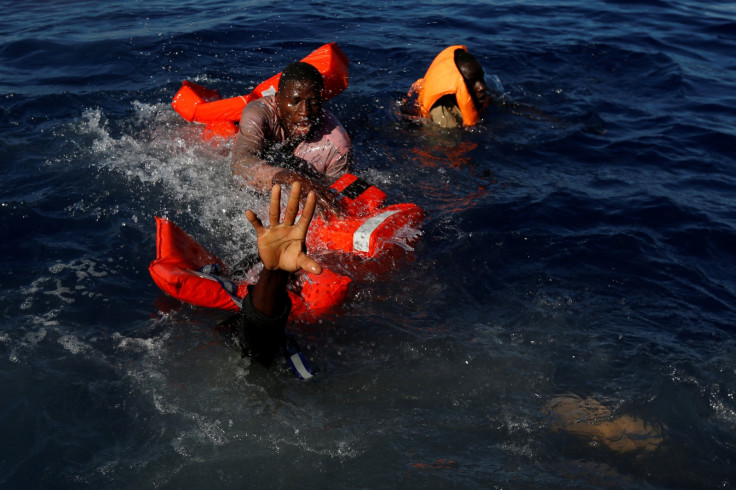More than 100 migrants feared dead crossing Mediterranean, 2,000 rescued
'The sea continues to be a graveyard,' said Médecins Sans Frontières.
More than 2,000 people were saved from the Mediterranean on Friday (14 April) in a day of dramatic rescue operations.
The migrants had been trying to cross from Libya into Italy in 16 rubber dinghies and three wooden boats, but encountered rough seas and difficult conditions.
They were intercepted by the Italian Coast Guard and a handful of aid organisations before being taken to safety in Italian ports.
Videos from the rescues showed women rejoicing with songs, but the day had a sombre underlying. More than 100 people are believed to have drowned and one teenager was found dead in a dinghy.
"The sea continues to be a graveyard," charity Médecins Sans Frontières (MSF) said in a tweet.
According to the United Nations' High Commissioner for Refugees (UNHCR), more than 30,200 migrants and refugees have attempted to reach Europe by crossing the Mediterranean Sea in 2017 alone. At least 905 people have died or gone missing in the same time.
Darrin Zammit Lupi, a Reuters photographer who was present during Friday's rescue operations, said: "In 19 years of covering the migration story, I have never experienced anything like today."
The rescues come at a time when relationships between aid organisations and Frontex, the European Border and Coast Guard Agency, are fraught.
Frontex has accused groups such as MSF of acting "like taxis" for migrants and colluding with Libyan smugglers. Aid groups deny the claims, stating that their work is the difference between life and death.

In a tweet directed at Forex, European Commission President Jean-Claude Juncker and European Council President Donald Tusk, MSF said: "How many people would have crossed if we weren't there today, Frontex? Probably the same.
"How many would have died? Probably, many more."
How many people would have crossed if we weren't there today, @Frontex? Probably the same. How many would have died? Probably, many more. pic.twitter.com/gD1jUAeSKn
— MSF Sea (@MSF_Sea) April 14, 2017
A number of journalists have also come forward to defend the work of NGOs in the Mediterranean, amid the accusations.
Zach Campbell, a journalist specialising in migration, said: "[Frontex Director Fabrice] Leggeri repeats the accusation that NGOs collude with smugglers. If Frontex has evidence of collusion, why don't they publish it?
"The only evidence so far: one report leaked to the FT, [which is] badly sourced and full of errors."
10. Leggeri repeats the accusation that NGOs collude with smugglers. If Frontex has evidence of collusion, why don’t they publish it?
— Zach Campbell (@notzachcampbell) April 14, 2017
11. The only evidence so far: one report leaked to the FT, badly sourced and full of errors. Published in full here: https://t.co/NlTfMhkCbp
— Zach Campbell (@notzachcampbell) April 14, 2017
© Copyright IBTimes 2025. All rights reserved.






















